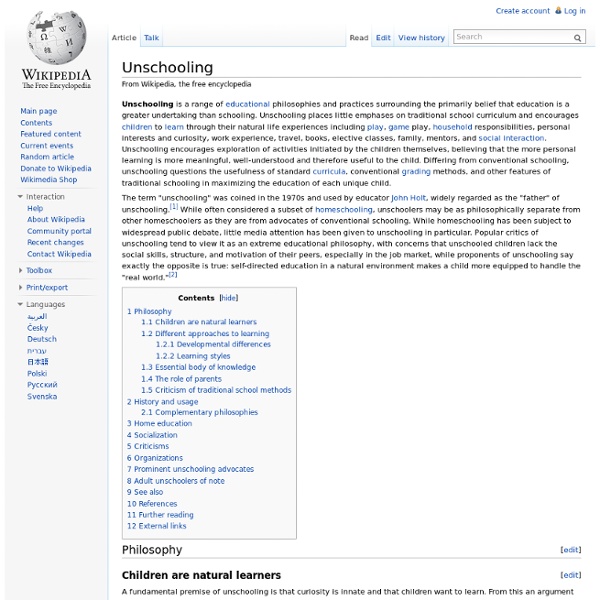One The Event - Social Architecture
"12 Pillars of Human Endeavor" Origins Originally designed by futurist & social architect, Barbara Marx Hubbard, Founder of the Foundation for Conscious Evolution, the 12 Pillars shown here (above) match & advance Barbara's popular12 point Wheel of Co-Creation (right) based on the Model of the Peace Room, which focuses on a world that works for all. Barbara along with many others including officials in Washington DC saw this wheel as an open-source tool that would help us define and bridge us from old hierarchical systems to ones based in co-creation and bridging resources and needs in evolutionary ways. How we use it Each pillar is self explanatory. Embracing Whole-System(s): Beyond the Pillars While the Pillars cover the WHAT (solutions, impact areas, and issues); facilitating meaningful collaboration also requires coherence, trust and synergy. More about the 12 Pillar Model & its Purpose
Canadian Unschooler
Peer-to-Peer Learning Handbook | Peeragogy.org
Unschooling
"Read a little, try a little, wait a while, watch." People learn by playing, thinking and amazing themselves. They learn while they're laughing at something surprising, and they learn while they're wondering "What the heck is this!?" My favorite and oldest discussion group is called AlwaysLearning, where the principles underlying unschooling are the topic. On facebook, my less favorite but busier discussion: Radical Unschooling Info If unschooling can't work in the real world, nothing at all can. Grover and the Everything in the Whole Wide World Museum. I've removed the link I had because used copies on Amazon are listed way too high. The way adults tend to learn things is the way people best learn—by asking questions, looking things up, trying things out, and getting help when it's needed. Regional groups, lists and resources (by language, nation, state, religious or special focus) THIS PAGE IS OLD for a webpage.
Word Matters
Collective work by some thirty authors from civil societies all over the world, deciphers the central concepts of the information society”. Technology is never neutral: it carries social, economic and cultural consequences. New information and communication technologies are no exception.The words used in international negotiations or legislation are a poor reflection of such consequences; they propagate perceptions that are rarely subjected to democratic debate, the fundamental requirement for any political decision. This book subjects the concepts of the information age to critical perspectives from different sensibilities and cultures, thus introducing alternative visions. Contents Towards Knowledge-Sharing Societies - Alain Ambrosi / Valérie Peugeot / Daniel Pimienta Word Matters: story of a Project - Alain Ambrosi / Valérie Peugeot / Daniel Pimienta Information Society and Knowledge Society - Sally Burch Networked and e-Governance - Partha Pratim Sarker Internet Governance - Carlos Afonso
Family Unschoolers Network - Unschooling Support
BUILDING LIVING NEIGHBORHOODS
If you are one of a group of friends who are talking about building a new place to live a better life, this website can show you ways of working that are inspiring and related to the things which matter in your lives. The ACTION & PRACTICE pages will guide you. If you are a developer or landowner, this website can show you ways of working that are more capable of creating healthy, hospitable and beautiful places for people to live, than present forms of practice typically allow. It does not cost more. If your family or business is helping to rebuild an old neighborhood, or moving to a new one, this website will give you tools and a voice which will be heard, so you can genuinely influence what happens. If you are a community organizer, or a leader in a local community, this website will give you tools to be sure that residents and local businesses can play an effective and practical part in decision making, which will be heard.
The Beginner’s Guide to Unschooling
Post written by Leo Babauta. There’s nothing I get asked about more as a parent than unschooling, and nothing I recommend more to other parents. It’s an educational philosophy that provides for more freedom than any other learning method, and prepares kids for an uncertain and rapidly changing future better than anything else I know. And yet, as powerful as I believe unschooling to be, I’ve never written about it, because the truth is, I certainly don’t have all the answers. The beauty of unschooling is in the search for the answers. But I’m getting ahead of myself: what is unschooling? What is Unschooling? First, it’s a form of homeschooling. However, this is how I describe it — in contrast to school: Let me emphasize that for a minute: in unschooling, life itself is learning. This is how I learn as a self-employed writer, as an entrepreneur, as a parent. Why Unschool? Unschooling takes a different approach: kids learn how to learn, how to teach themselves. More reasons to unschool:
2012 Trivium Study Guide Version 2 / Edited by Tony Myers



